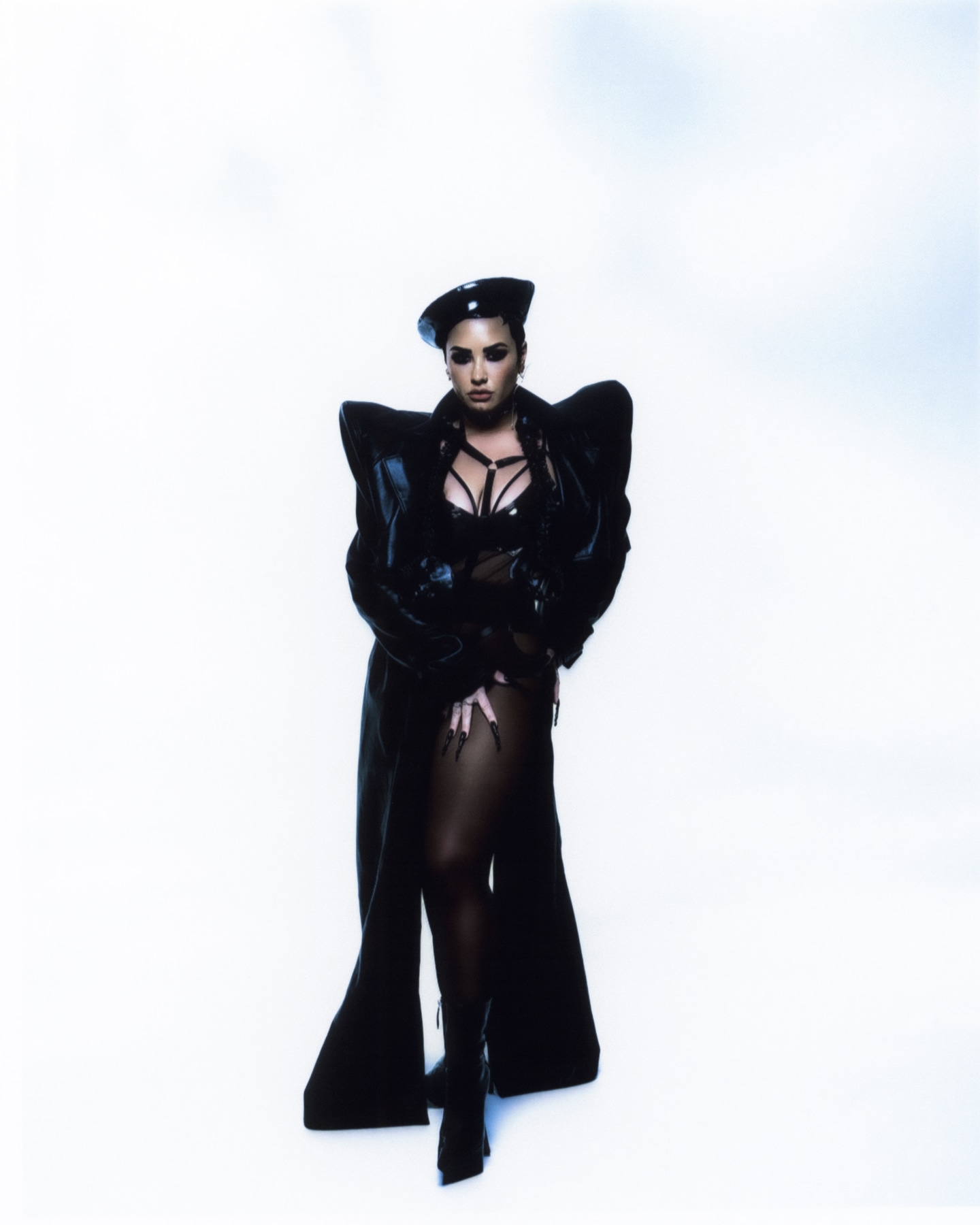 Brandon Bowen
/
Universal
Brandon Bowen
/
Universal
In the music video for “Don’t Forget,” Demi Lovato spent most of her time standing in the pouring rain, concealed underneath a black umbrella and communicating deep rooted teenage angst with tender emotion. She had written the record alongside the Jonas Brothers for her 2008 debut album of the same name, released on Disney Music Group’s Hollywood Records, a label that was pushing pop-rock hard at the time. It was the perfect one-size-fits-all genre for the young women beginning to plant the seeds for their pivot away from Disney Channel in the late 2000s: pop enough to hook a mainstream audience, rock enough to give them an edge while maintaining the sexless image established during an era of purity rings and excessively layered outfits.
Miley Cyrus took it for a spin on Breakout in 2008 with guitar-heavy hits like “Fly on the Wall” and “7 Things.” Soon, Selena Gomez and The Scene (her now defunct pop-rock band) debuted with Kiss & Tell. Both singers eventually made a full pivot to pop — although Cyrus would find her true Joan Jett footing much later on Plastic Hearts and, as it turns out, Gomez actually had a stronger knack for Latin pop than anything else. But Lovato (who uses both she/her and they/them pronouns) was particularly well-suited to the rock sound from the beginning. It was the only genre that could hold both the power of her voice and the emotion in their lyrics without tamping either down. By the time the bridge hit in “Don’t Forget,” Lovato had ditched the umbrella. Drenched, they slammed on their guitar and wailed: “Somewhere we went wrong / We were once so strong.”
Lovato was on a hot streak. Across Don’t Forget and its follow-up, 2009’s Here We Go Again, they had writing credits on 80% of the tracks. And then two years passed without the singer releasing any new music. In 2010, when she was 18 years old, Lovato checked into an in-patient treatment facility to target issues related to substance abuse and an eating disorder. Six months after she returned, she released the lyrically pointed comeback single from her 2011 album Unbroken, a chilling piano ballad called “Skyscraper” that ditched rock for a more polished pop. Lovato’s voice carried with it the same deep-cutting emotion of their earlier records. “As the smoke clears, I awaken and untangle you from me,” they sang, asking in an almost whisper: “Would it make you feel better to watch me while I bleed?”
The next line was piercing: “All my windows still are broken, but I'm standing on my feet.” Lovato conveyed an exceptional amount of power in their voice and brought perseverance and ownership to her delivery. As lived-in as the lyrics felt, the song was not one of the five tracks Lovato co-wrote for Unbroken. There’s a cruel irony in her least-involved album featuring the single that would come to define her as a representative of resilience and recovery, while also being the one to push her directly underneath the grand pop arena’s relentless magnifying glass. “Skyscraper” is still one of the staples on Lovato’s tour setlists, performed alongside songs from all eight of their studio albums, including the newly released return-to-rock record Holy Fvck.
During a recent stop on her current tour promoting the album, Lovato posted and soon deleted an Instagram Stories post essentially throwing in the towel on expansive live performance schedules following the North American leg of the trek. “I’m so fucking sick I can’t get out of bed,” she wrote. “I can’t do this anymore. This next tour will be my last. I love and thank you guys.” While they didn’t elaborate on the possibility or their illness, the declaration is part of a larger trend of pop musicians stepping back from touring citing health concerns, both physical and mental, most recently including Shawn Mendes and Justin Bieber.
But for Lovato, the normal strain of being on the road for weeks, or months, at a time doesn’t compare to the strain their body has been through in the past. In her 2021 documentary Dancing with the Devil, which recounted Lovato’s recovery from a near-fatal overdose in 2018 following six years of sobriety, she revealed that she suffered three strokes and a heart attack following the incident. “For the past couple of years, I’ve heard a lot of stories about my life and what people think has happened. I wanted to set the record straight and reveal it all for my fans,” Lovato told reporters during a press tour promoting the docuseries. “I was left with brain damage and I still feel the effects of that.”
How’s that for resilience? Constantly getting ahead of the narrative, Lovato has shared three documentaries throughout the course of her career: Stay Strong (2012), Simply Complicated (2017), and Dancing with the Devil (2021). The films or docuseries always concluded with a celebratory tone, a sense that Lovato was back on track, even though she would later reveal that she was under the influence of various substances while filming those same interviews about her celebrated sobriety. There was a sense that whenever Lovato allowed her audience inside of their struggles with addiction and abuse, it needed to end with her getting better and staying better — as if it were that easy.
In December, after attempting to limit themself to weed and alcohol in moderation, they entered treatment again. When Lovato came out and began working on Holy Fvck, it was with the realization that they don't owe anyone but themself a happy ending or a glossy resilience anthem.
In the music video for Holy Fvck's lead single “Skin of my Teeth,” Lovato is back in the rain. But she doesn't try to play it safe this time around — there’s no umbrella to hide under and ditch later on. Instead, they embrace the storm from the very beginning. “Demi leaves rehab again,” she spits out in the opening verse. “When is this shit gonna end?” It’s a biting reflection of the narratives that have emerged after their stints in treatment, and later on, she issues a much-needed reminder: “I don't need you to keep score / When I'm the one who's at war.”
Holy Fvck is a capsule of all of the battles Lovato has been fighting. On “Eat Me,” she sheds the weight of the expectations that have followed her for over 15 years, particularly as she's come out as non-binary (“I know the girl that you adored / She's dead, it's time to fucking mourn”). Elsewhere, on “Happy Ending,” she confronts her own mortality, wondering what will remain of their authenticity if they don’t set the narrative straight while they can (“Am I gonna die trying to find my happy ending?”). Meanwhile, “29” pulls back the curtain on an inappropriate past relationship through the lens of Lovato’s current perspective at 29, the same age as their partner when she was 17 (“Far from innocent, what the fuck's consent? / Numbers told you not to, but that didn't stop you”).
“When you get older, you start to realize where your trauma comes from,” Lovato told Vogue in a recent interview. “There’s a healthy amount of angst when it comes to understanding your trauma and honoring it — honoring your anger. In order to be spiritually balanced, you can’t ignore the negative feelings that you have, because then you’re just pretending and living with this facade that everything’s okay all the time.” With “Dead Friends,” she filps the lingering trauma of survivor’s guilt on its head with a eulogy that embraces the complex emotions of grief, both positive and negative. It’s one of Holy Fvck’s best displays of the singer’s comfort in rock music, Lovato using shifts in the track’s tempo to drive the narrative forward.
“I went into this album with the intention of separating myself from the music that I’ve been doing, and embarking on a new journey that was grounded in the roots of where my music started,” she told Billboard. Lovato had dipped her toe into the water in 2020 with the “emo version” of her one-off single “I Love Me,” which featured Travis Barker, though it was tamer than the majority of Holy Fvck. As she circles back to the music of her first two albums in full force for the first time in 13 years — albeit while leaning more rock than pop — she embraces the freedom of the sound as a means of reclaiming her power.
For Lovato, regaining control also meant devouring the anxieties that lingered from lessons instilled in her before they were old enough to fully understand them. On “Heaven,” a bible verse condemning masturbation becomes the centerpiece of a song that has the singer declaring they'd rather her right hand be cut off than continue to shame herself for embracing her sexuality. Then, “City of Angels” takes that embrace all over California. Later on, they take stock of romance, penning the love song “4 Ever 4 Me” to close out the album with an appreciation for how far they've come — they're able to lead with the vulnerability they shied away from in the past.
Lovato’s past records shaped themselves out of bits and pieces of her narrative, particularly the parts that were best packed up with the gloss of radio-ready pop. In a recent interview with Alternative Press, she looked back on the slate of documentaries that have accompanied the music: “I wish I would have waited until I had my shit figured out more because now it's cemented.” They have constantly weathered the storm with all the resilience of someone who’s no stranger to crashing and burning and rebuilding herself while the world watched. But Holy Fvck doesn’t push a narrative of surveilled perfection. Instead, it chooses to lead with sincerity, spotlighting the highs and lows of an artist who doesn’t have it all figured out and isn’t rushing to a conclusion.
